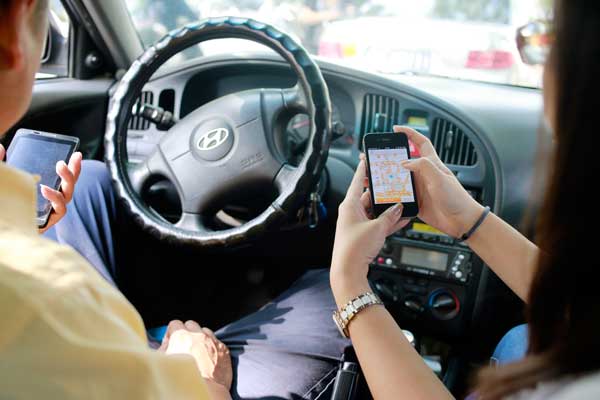 |
| A passenger and taxi driver look up information on didi taxi, one of the first four taxi apps integrated into the public dispatching platform, 96106, in Beijing. Feng Yongbin / China Daily |
The story of a Taipei tourist shunned in July by more than 20 taxi drivers during rush hour in Xi'an has aroused heated debate on the city's transport problems. While it may seem to be an extreme example, the phenomenon is not uncommon in most cities.
Even when Bejing is crawling with taxis, it used to take Zhang Xiaowen, an office worker, almost half an hour to hail one at 7 am.
The difficulty in hailing a cab has seen a surge in the number of taxi apps.
Kuaidi taxi is particularly popular in the Shanghai metropolitan area. Users type in their location and intended destination, or simply speak the address while pressing the voice button. When nearby drivers receive the message, they click on a button and confirm the passenger's location.
"I think it offers great convenience. Seventy percent of taxi drivers in Ningbo use kuaidi, and now I have far less idle time. I basically earn 200 yuan ($32) more each day with this app," said Leng Guoquan, a taxi driver in Ningbo.
But like any other emerging sector, taxi apps are attracting too many operators who basically provide the same service. As of July, there were about 50 taxi-hailing apps in China, among which the most popular apps kuaidi taxi and didi taxi each had a market share of about 39 percent, followed by yaoyao taxi with 12.3 percent and E-taxi with 3.6 percent, according to android platform download statistics from EnfoDesk Analysis International.
The overheated competition has led to an unruly marketplace. Small companies, in order to survive against the big players, have planted too many advertisements in the apps. Some app designs allow passengers to bid for taxis at much higher fares than normal. The surcharge ends up in the pocket of the driver.
Consequently, feedbacks from passengers is not all positive. Liu Wenzhong, an office worker in Bejing, was dropped by a taxi driver in the middle of a traffic jam. Liu believed the driver had received an offer for the lucrative airport run.
Safety is another concern. Liu Zhongnan, a Bejing taxi driver, admitted he used to subscribe to two or three such apps, and kept checking them while driving.
3 main concerns
Many cities launched crackdowns on some of these apps in an effort to restore more order to the market. Shenzhen even took an initiative in May that required all taxi drivers to remove the apps.
Han Biao, a professor at Shenzhen University, said the ban was caused by three main concerns. "Bidding up the fares, anything from 5 yuan to 30 yuan, violates the taxi regulation that forbids negotiated prices. Bidding and ordering without checking the real identity of the driver may attract unlicensed ‘black cabs', and some drivers pick up their phones while driving to confirm the location and this is also against traffic rules," he said.
Although the authority banned the use of taxi apps, the reality was a different story. Many taxi drivers bring two mobile phones — one with the app installed, one without, in case of being stopped for inspection.
In Bejing, the crackdown was milder. Instead of a total shutdown, the city's transport commission stopped the bidding feature and mandated all taxi apps be integrated into a public dispatch platform called 96106 that distributes orders among the city's official five dispatch centers. A call fee of 5 yuan was allowed.
Didi taxi, the most popular app in Beijing and Guangzhou, was among the first four taxi apps that integrated into the service platform. Cheng Wei, CEO of didi taxi, said, "With the official dispatch centers coming in, it will help taxi app companies provide better service." Kuaidi and didi both strengthened the verification process for taxi drivers.
However, the integration also raised concerns. "I think the biggest draw of taxi apps is that they are much more efficient than directly calling a taxi from the official dispatch center," Liu Xi, a regular passenger said. "I wonder if this new platform will diminish that advantage."
Liu also complained about the removal of the voice feature that confirmed a passenger's location. "Before the app was integrated into the official platform, you could simply say where you wanted to go. Now the feature has been removed, I have to type it word by word. I don't know why they removed that feature."
Despite all that, Liu Zhongnan, a Bejing taxi driver, said the taxi app still helps him, even though the Win-to-Bid feature has been dismantled. "With the app, I at least know where the nearby passengers are and where they are going. This has saved me a lot of unnecessary expenditure," Liu said.
Added incentives
In response, app companies started to adjust their strategy but many have shut down, unable to adapt to the changing market.
Lyu Chuanwei, CEO of kuaidi taxi, said recently that about 40 taxi app providers have gone bankrupt because of stringent government rules and rising promotion of fares. "The end of 2013 will be a watershed for China's taxi app companies," he said.
To encourage taxi drivers to install their app, these companies have spent a lot on accessories, such as phone holders, car chargers and prepaid phone cards. Some even provided drivers with a free tablet PC. Passengers are also rewarded, with some companies sending 10 yuan bonuses to newly registered users.
To add more incentive for taxi drivers, kuaidi pays taxi drivers who remain logged onto their app for a fair amount of time 80 yuan to cover their mobile Internet fares.
Shen Lei, a post-doctoral fellow at Renmin University of China, said: "This is a typical phenomenon in the Internet industry. In the first days companies don't make any profit. Losing money is a stage you cannot avoid, but competition will allow the powerful ones to emerge. They may survive growing pains with venture capital poured in.
"Once user habits are established, they won't easily shift to other apps. For the major players in the taxi app sector, the priority is to seize enough users and foster market share. The profit model should be resolved in a later date."
Seeking partnerships
In April 2013, didi collected $25 million from Tencent and in May, kuaidi reportedly received several million US dollars from Alibaba.
Zhao Dong, COO of Kuaidi taxi, said it doesn't expect a profit in the next two years and is focused on optimizing its apps and services.
He also hoped the government will open up more traffic data for companies like his to upgrade the user experience. "The most effective use of taxi apps is to resolve the idling rate. When we can get hold of more traffic data, users can spot on our app which taxis nearby are idle or not," he said.
While app companies called on the government to open up new solutions, Beijing's transport authority said it will introduce a pay-in-advance mechanism onto the taxi app platform. Call fees will be temporarily held by a third party, and be sent to the driver after receiving positive feedback from the passenger, or when the passenger does not show up as promised. A review system will also be introduced.
In the meantime, the major players in the taxi app industry are also seeking new partnerships and more resources to extend their online-to-offline business. Kuaidi last month announced that it will be integrated into Alipay — China's leading online payment service — to allow mobile payment. Yaoyao taxi has started cooperating with Pod inns, a chain hotel operator. Its rooms are equipped with iPads with a preinstalled yaoyao app.
Shen from Renmin University said, "These efforts show that both the companies and government have started to make moves based on how to create trustworthy, high-quality and easy-to-use services."
More taxis needed
However, apps and new technology may be part of the answer to quicker city mobility, but hailing a cab is still not easy.
According to the Beijing Commission of Transport, the number of taxis within the city, 66,600, hasn't undergone any drastic change in the past few years, and is not likely to change before 2015.
The government has been controlling the number for many years and this number, 66,600, was established in 1993.
Two decades later, the demand has surged amid greater urbanization.
According to the Beijing Statistical Information Net, the permanent population in Beijing 20 years ago was about 11 million, and in 2012 the number was more than 22 million.
Yan Yiqi in Hangzhou contributed to this story.
 Pakistan suffers desperate shortage of water
Pakistan suffers desperate shortage of water Lanzhou MAC conducts actual-troop live-ammunition drill
Lanzhou MAC conducts actual-troop live-ammunition drill Heritage train ride across western Kosovo
Heritage train ride across western Kosovo Baby girl 'too young' for birthmarks treatment
Baby girl 'too young' for birthmarks treatment Beijing court hears airport blast case
Beijing court hears airport blast case Harbin named Chinese city with most beautiful women
Harbin named Chinese city with most beautiful women Wushu spirit
Wushu spirit Rugby girls
Rugby girls Funniest photos of sport stars as kids
Funniest photos of sport stars as kids  Residences of the royal house of Savoy
Residences of the royal house of Savoy China's frigate 'Bengbu'in fire training
China's frigate 'Bengbu'in fire training The last days of Wan Aihua
The last days of Wan Aihua Highlights at 12th National Games of China
Highlights at 12th National Games of China Beijing Film Academy welcomes freshmen
Beijing Film Academy welcomes freshmen 2013 Taiwan Int'l Tourism Expo kicks off in Taipei
2013 Taiwan Int'l Tourism Expo kicks off in TaipeiDay|Week|Month